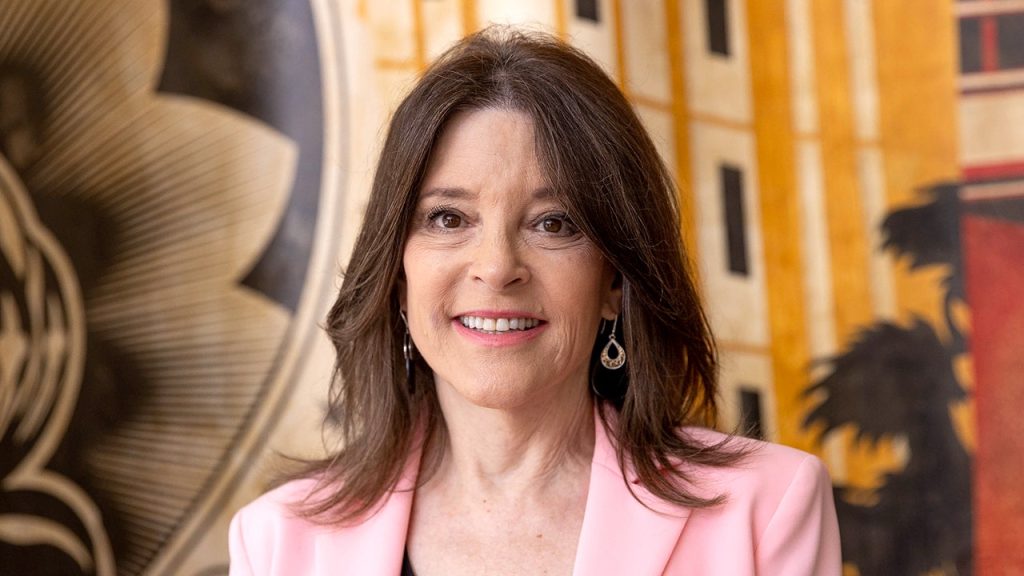Marianne Williamson, a spiritual and political activist, and former Democratic presidential candidate, has thrown her hat into the ring for the position of Democratic National Committee (DNC) chair. Her announcement, delivered through a letter addressed to DNC members, outlines a vision of a reinvented Democratic Party, one equipped to counter the unique political landscape shaped by Donald Trump’s presidency. Williamson argues that the Democrats’ current toolkit, while effective in the past, is insufficient to overcome the 21st-century political movement embodied by Trump’s MAGA platform. She emphasizes the need for a deeper understanding of the psychological and emotional drivers behind Trump’s appeal, recognizing that traditional campaign strategies alone won’t suffice in this new era.
Williamson’s core argument centers on the necessity of engaging with the emotional resonance of Trump’s message. She believes that dismissing Trump’s success as mere political theater is a dangerous mistake. Instead, she advocates for acknowledging the effectiveness of his approach, which has both galvanized his base and alienated a significant portion of the American electorate. This understanding, she argues, is the key to developing a counter-narrative that can effectively recapture the hearts and minds of voters. Her proposed approach moves beyond conventional campaign tactics like data analysis, fundraising, and field organizing, emphasizing the importance of igniting a renewed sense of patriotism and connecting voters to the historical legacy of the country.
According to Williamson, the Democratic Party must tap into a deeper well of emotional engagement. She envisions a party that inspires a “surge of patriotic fervor” and rekindles a sense of connection to the nation’s historical ideals. This approach, she believes, will create a compelling narrative that resonates with voters on a deeper level than traditional political messaging. Ultimately, Williamson aims to create a perception among voters that supporting the Democratic Party is the most effective way to uphold the country’s legacy and secure its future. This strategy involves moving beyond the purely rational appeals of policy positions and engaging with the emotional and psychological drivers that influence voter behavior.
Williamson’s entry into the DNC chair race adds another layer of complexity to the ongoing internal debate within the Democratic Party. Her candidacy represents a departure from the established political norms and conventional wisdom that have traditionally guided Democratic campaigns. Her emphasis on the emotional dimensions of politics challenges the prevailing focus on data-driven strategies and policy debates. This unconventional approach could potentially resonate with voters who feel disenfranchised by traditional politics, but it also carries the risk of alienating more moderate voters. The success of Williamson’s bid for DNC chair will depend on her ability to convince party members that her unique approach is the key to future electoral victories.
The race for DNC chair reflects the broader struggles within the Democratic Party as it seeks to chart a path forward in the post-Trump era. The party is grappling with fundamental questions about its identity, its message, and its strategies for connecting with voters. Williamson’s candidacy represents a distinct vision for the future of the party, one that prioritizes emotional engagement and a renewed sense of patriotism. However, she faces stiff competition from other candidates who advocate for more traditional approaches. The outcome of the DNC chair race will have significant implications for the direction of the Democratic Party in the years to come.
Williamson’s prior attempts to secure the Democratic presidential nomination in 2020 and 2024, though unsuccessful, provide context for her current bid. Her experiences on the campaign trail have shaped her understanding of the challenges facing the Democratic Party and informed her vision for its future. Her background as a spiritual leader and author has also contributed to her unique perspective on politics, emphasizing the importance of values, empathy, and emotional connection. This perspective sets her apart from other contenders for the DNC chair position and offers a potentially transformative vision for the future of the party. The question remains whether the Democratic Party is ready to embrace such a radical departure from traditional political strategies.


